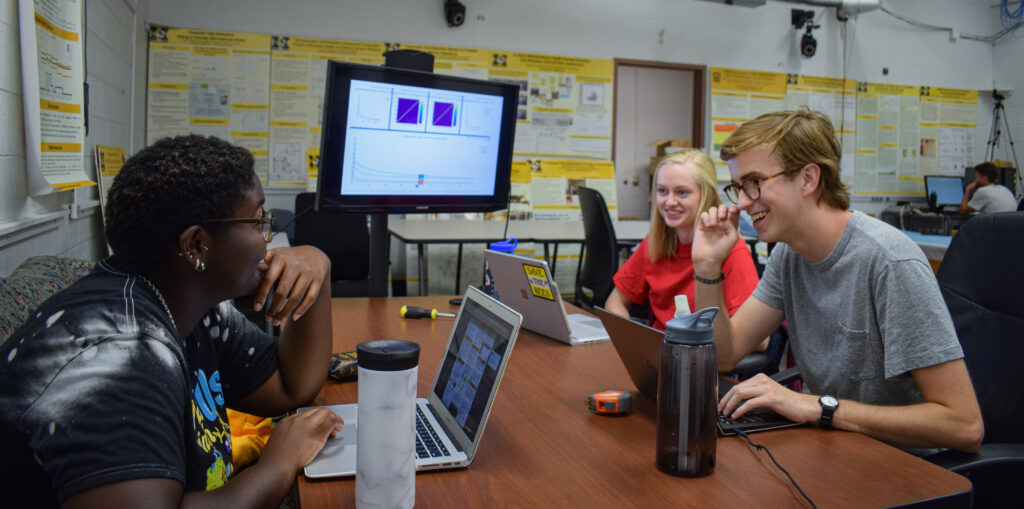August 08, 2019

Shaniah Tullis, Carter Sifferman and Zoe Moore were three of 10 participants in the NSF REU site Undergraduate Research in Consumer Networking Technologies. Photo by Liz Lannin.
Mizzou Engineering is proud of its tradition of giving undergraduates real-world lab experience through undergraduate research. In fact, Mizzou is listed as one of the top 10 universities in the country for undergraduate research. And, each summer, MU and Mizzou Engineering extend that tradition to students from across the country through the National Science Foundation Research Experiences for Undergraduates (REU) program.
Prasad Calyam, associate professor of Electrical Engineering & Computer Science, has been one of the leaders for Mizzou Engineering’s three REU sites — Undergraduate Research in Consumer Networking Technologies — for several years. This REU focuses on issues including software-defined networking, visual computing at the network edge, social health networking for eldercare, body-area sensing and emotion recognition.
Ten students were selected from a group of 100 applicants, and they had the opportunity to work with Calyam and other world-class MU Electrical Engineering & Computer Science faculty members Yi Shang, Marge Skubic, Ye Duan, Zhihai He, Kannappan Palaniappan and Khaza Anuarul Hoque. In the 12th edition of this NSF REU site, they worked on research currently being conducted by these faculty mentors and their graduate students. They took tours of MU facilities — including the research computing data center — did outreach with local middle school students, attended seminars and gave final poster presentations at the MU Summer Undergraduate Research and Creative Achievements Forum.
“The students are really motivated and are impressively productive,” Calyam said. “Each project team in this year’s REU program has generated a peer-reviewed publication manuscript similar to other project teams in the past. Our long-standing REU site has this distinction where undergraduate students consistently reach a peer-reviewed publication milestone. I attribute this level of success in a 10-week research training program to the commitment of the faculty and graduate student mentors every year in designing and executing exciting projects with the REU students.”
“I was surprisingly happy about the flexibility of the program,” Yale’s Miles Krusniak said. “We’ve had the ability to split up the work and take these giant problems and turn them into something we can handle.”
During their time in Columbia, participants had the opportunity to work on a variety of projects dealing with topics such as virtual reality learning environments, unmanned aerial vehicle image processing, object detection and utilizing sensors to aid assessments of stroke victims during rehabilitation. The projects and the students working on them were:
- Anomaly Detection of Security, Privacy Attacks Disrupting Users Immersive Experience in Virtual Reality Learning Environments — Benjamin Frailey, Mizzou; Brady Kruse, Mississippi State; Boonakij Palipatana, Cornell
- Energy-aware Dynamic Computation Offloading for Video Analytics in Multi-Unmanned Aerial Vehicle Systems — Aditya Vandanapu, Illinois-Chicago; Jeromy Yu, Purdue
- A Detection Confidence-Regulated Path Planning Algorithm for Improved Small Object Counting in Aerial Images — Krusniak, Yale; Keaton Leppanen, Truman State
- In-Home Daily Activity Recognition and Assessment System for Stroke Rehabilitation — Shaniah Tullis, Lincoln University in Pennsylvania; Carter Sifferman, Drury; Zoe Moore, Truman State
Several of the students had limited or no hands-on laboratory experience when they came to Mizzou for the 10-week program. They left Columbia with a whole new outlook on research.
“This program has been wonderful, and I have learned and accomplished more than I thought possible in 10 short weeks. I especially appreciate the tone set by the faculty mentors from Day 1 — forgiving yet challenging, and encouraging all the way,” Kruse said.
“I wanted this summer to do something a bit more interesting and something that would challenge me and allow me to explore areas of computer science I hadn’t gotten to tackle in previous summer work and internships,” Leppanen said. “That’s this program in a nutshell. I’ve gotten exposed to a ton of new technology, and the projects are awesome.”